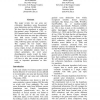184 search results - page 8 / 37 » Learning Expressive Models for Word Sense Disambiguation |
CORR
2000
Springer
13 years 7 months ago
2000
Springer
This paper revisits the one sense per collocation hypothesis using fine-grained sense distinctions and two different corpora. We show that the hypothesis is weaker for fine-graine...
ACL
1996
13 years 9 months ago
1996
In this paper, we present a new approach for word sense disambiguation (WSD) using an exemplar-based learning algorithm. This approach integrates a diverse set of knowledge source...
ACL
2003
13 years 9 months ago
2003
A central problem of word sense disambiguation (WSD) is the lack of manually sense-tagged data required for supervised learning. In this paper, we evaluate an approach to automati...
FGCN
2008
IEEE
14 years 2 months ago
2008
IEEE
Word sense disambiguation has always been a key problem in Natural Language Processing. In the paper, we use the method of Information Gain to calculate the weight of different po...
COLING
1992
13 years 8 months ago
1992
This paper describes a program that disambignates English word senses in unrestricted text using statistical models of the major Roget's Thesaurus categories. Roget's ca...

